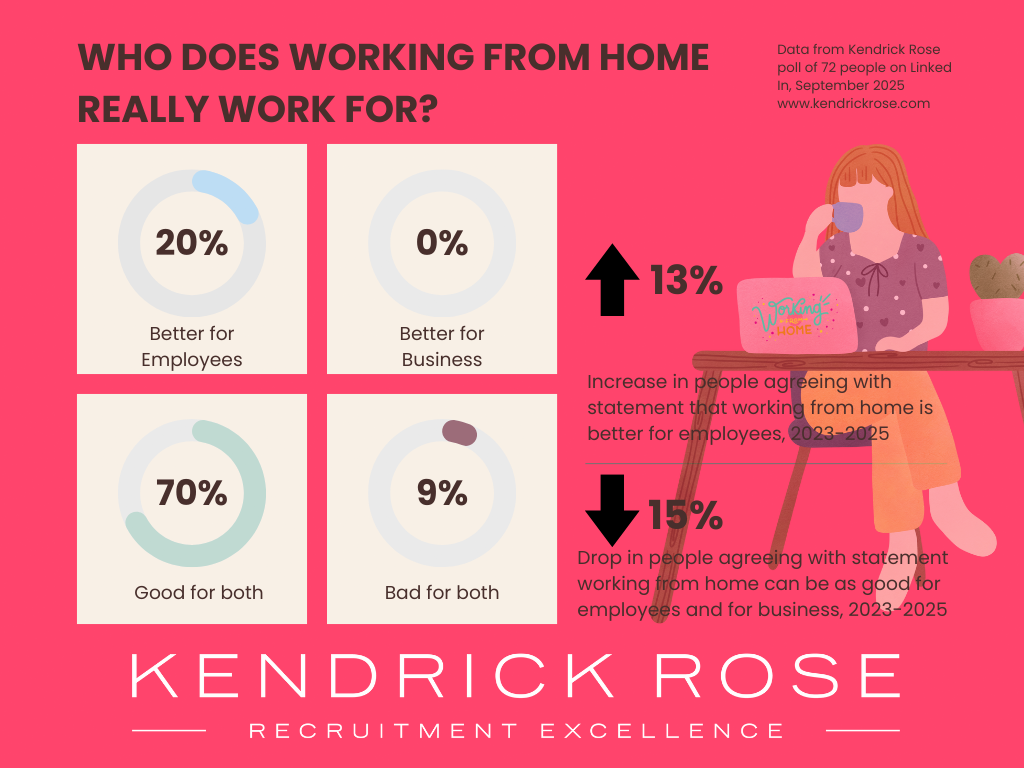Working from home becoming less popular with Jersey Financial Service professionals
Posted on 23/09/25
Financial Services professionals in Jersey are becoming less enthusiastic about working from home according to new data.
When asked the question ‘Who does working from home really work for?’ 70% of islanders surveyed agreed with the statement ‘It can be good for both’, - a drop of 15% since 2023.
The poll, by Kendrick Rose, a recruitment consultancy based in Jersey, also found a shift in sentiment towards the statement ‘It’s better for employees’, up from 7% to 20% in two years.
While no one agreed with the idea that working from home is better for business, 9% selected ‘It can be as bad for both’, - a small rise since 2024 (5%) and 2023 (7%).
Shelley Kendrick, Managing Director, Kendrick Rose, said: “It’s clear that while the vast majority of Financial Services employees we surveyed value working from home and believe it benefits both the individual and the company, it’s becoming less popular as people experience negative aspects over the longer term.”
The data reflected differences in attitude for gender, with only 58% of male respondents agreeing working from home can be good for both, compared to 77% of female respondents. Furthermore, 21% of men said working from home was bad for both employees and business, compared to just 4% of women.
Shelley said: “Men were more likely than women to view remote work negatively for both sides, which could reflect concerns around collaboration, visibility, or leadership dynamics. Women may see remote work as more balanced and mutually beneficial possibly due to gains in flexibility, caregiving balance, or wellbeing.”
Younger workers may also be behind the drop in enthusiasm. Data from Gallup indicates less than a quarter of Gen Z workers (23%) would like to work from home every day, compared to 35% of Millennials, Gen X, and Boomer workers. However, that doesn’t mean they always want to work from an office either. Just 6% of Gen Z said they preferred exclusively working on-site, compared to 4% of Millennials, 9% of Gen X, and 10% of Boomers.
Shelley said: “While our poll did not record responses according to age group, the shift from 2023-2025 may also reflect a growing number of Gen Z entering the workplace who are demonstrating a desire to be in the office some of the time to share and socialise with colleagues, benefit from learning opportunities, and reduce the loneliness younger generations face.
“Among our clients and candidates we generally see hybrid models, with maybe two days a week remote working, hitting the sweet spot for both employers and employees. Teams stay connected and can be productive, while individuals enjoy the flexibility which in turn helps staff retention. However, thriving in the workplace is not just about location; poor communications and unclear expectations can lead to isolation or burnout and make remote work worse for everyone. You need good leadership and trust and understanding on both sides.”

“It’s clear that while the vast majority of Financial Services employees we surveyed value working from home and believe it benefits both the individual and the company, it’s becoming less popular as people experience negative aspects over the longer term.” - Shelley Kendrick
